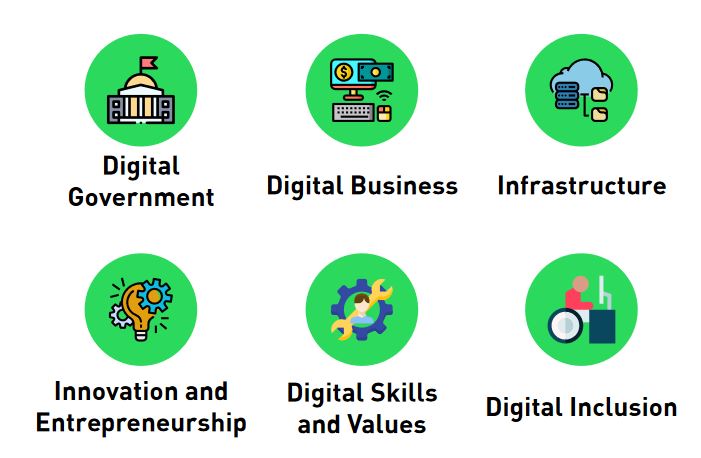Digital transformation: Overview of a study on Kenya’s digital readiness

Kenya ranked 116th out of 193 countries in the UN E-Government Development Index 2020 and has been on a steady journey towards embodying full digital transformation.
In light of the advancements made by the Kenyan government, GIZ (Deutsche Gesellschaft für Internationale Zusammenarbeit), Estonian Centre for International Development (ESTDEV) and KICTANet developed the Kenya Digital Readiness Study.
The study provides an overview of the current digital government situation in Kenya and includes observations on the strengths and opportunities for improvement. Furthermore the study proposes recommendations for future activities the national and county government should undertake across multiple digital governance domains.
Below is a concise summary of the digital governance domains covered in the study and the recommendations to hasten Kenya’s digital governance adoption and implementation:
- ICT Coordination
ICT policy coordination in Kenya is rather decentralised. Although Kenya’s National Digital Master Plan sets out a rather detailed ICT coordination model and describes the monitoring and evaluation mechanism for the strategy, it is unclear how the policy will be implemented.
Key Recommendations:
- A high-level digital council should be mandated and enforced to set the national digital agenda across sectors as well as to harmonise and prioritise different digital transformation programmes.
- The creation of the Government Chief Information Officer (GCIO) position should be considered to ensure effective implementation of ICT policy
- Legal Framework
Most of the core legal acts related to digitalization are in place.The government should assign clear coordination for a legal analysis to a dedicated body or committee of legal experts and review any obstacles to further digitalization systematically across the sectors from the legal point of view.
Key Recommendation:
- A comprehensive legal analysis should be conducted to identify any obstacles to e-governance at the national level,
- Consider drafting a regulation on managing services and governing information, which would establish the principles for managing and developing public services and for managing, sharing and exchanging information in state information systems and databases.
- Develop the new Cybersecurity Strategy for 2022-2026
- Interoperability
Kenya’s registries are largely digital, however, the lack of common components for data exchange and service discovery hinder the development of services by making it harder to find the relevant registries and connect to them.
Key Recommendations:
- An inventory of information assets should be carried out. The government should have a clear and up-to-date overview of what type and content of data is collected across all institutions.
- Principles of data governance including data management, data description and data quality management need to be adopted on national and organisational level.
- Interoperability of data with data sharing and implementation of the once-only principle should be made binding in due course. Once-only means that the government must use and reuse the data it has already collected from the citizen (following all legal and privacy requirements), and it is forbidden to ask the same information from the citizen again.
- Digital identity and digital signatures
Kenya has a well-established civil registration and national identification system, with a unique ID number in place for its citizens and residents. For e-governance services to be useful for all types of governance tasks, it is essential that the users can identify themselves in a secure manner. Kenya has made considerable efforts to develop a national PKI system that consists of roles, policies, hardware, software and procedures needed to create, manage, distribute, use, store and revoke digital certificates that will securely identify Kenyan citizens.
Key Recommendations:
- Public service development should consider digital identity and digital signatures as core components. This approach supports implementation of digital identity and helps to identify users in a secure manner.
- The creation of a national authentication system that enables the electronic authentication and authorization of users when using electronic services at the national level will help agencies to save time and money by eliminating the need to develop separate solutions.
- Digital Skills
Digital literacy and ICT skills are prioritised highly in Kenya’s strategic documents aimed at enhancing its socio-economic competitiveness. However, internet connectivity, electricity, teacher training and information security still need close attention to boost the acquisition of comprehensive ICT literacy within the education system
Key Recommendations:
- Introduction of a multi-level digital competency model could be considered as a preceding step of the GoK plan to perform an ICT literacy audit. The model would differentiate between digital transformation leaders, ICT experts and other civil servants, and set out different skill requirements for them.
- Increase the level of digital skills of the general public. Strengthening of digital skills should be mainstreamed across curricula at all levels of education (primary, secondary, tertiary education, and further training).
- Digital Infrastructure
Access to ICT is essential as a basic prerequisite for e-governance. A minimum level of ICT infrastructure capacity is needed to implement e-governance projects. The main challenges in developing and providing digital infrastructure include limited coverage of national fibre infrastructure and limited internet penetration in the rural areas, network capacity constraints, lack of last mile infrastructure connectivity to all government institutions and limited access to infrastructure for private, business and educational use.
Key Recommendation:
- All public institutions need to have access to basic infrastructure components. This includes access to stable and affordable basic services such as electricity, Internet access or cellular network coverage, but also funding for internal hardware and software needs, incl. data management and information storage demands.
- International Cooperation
To benefit from the advantages that e-governance can provide for international relations (trade, free movement, research and education, etc.), it is important for states to take part in international cooperation (regional or other).
Key Recommendations:
- The organisation responsible for international cooperation in the field of digital government should identify, analyse, and implement global best practices relevant to digitalization.
- Develop a proof of concept for cross-border interoperability together with the private sector to improve their service provision or to ease their burden while communicating with the government.

